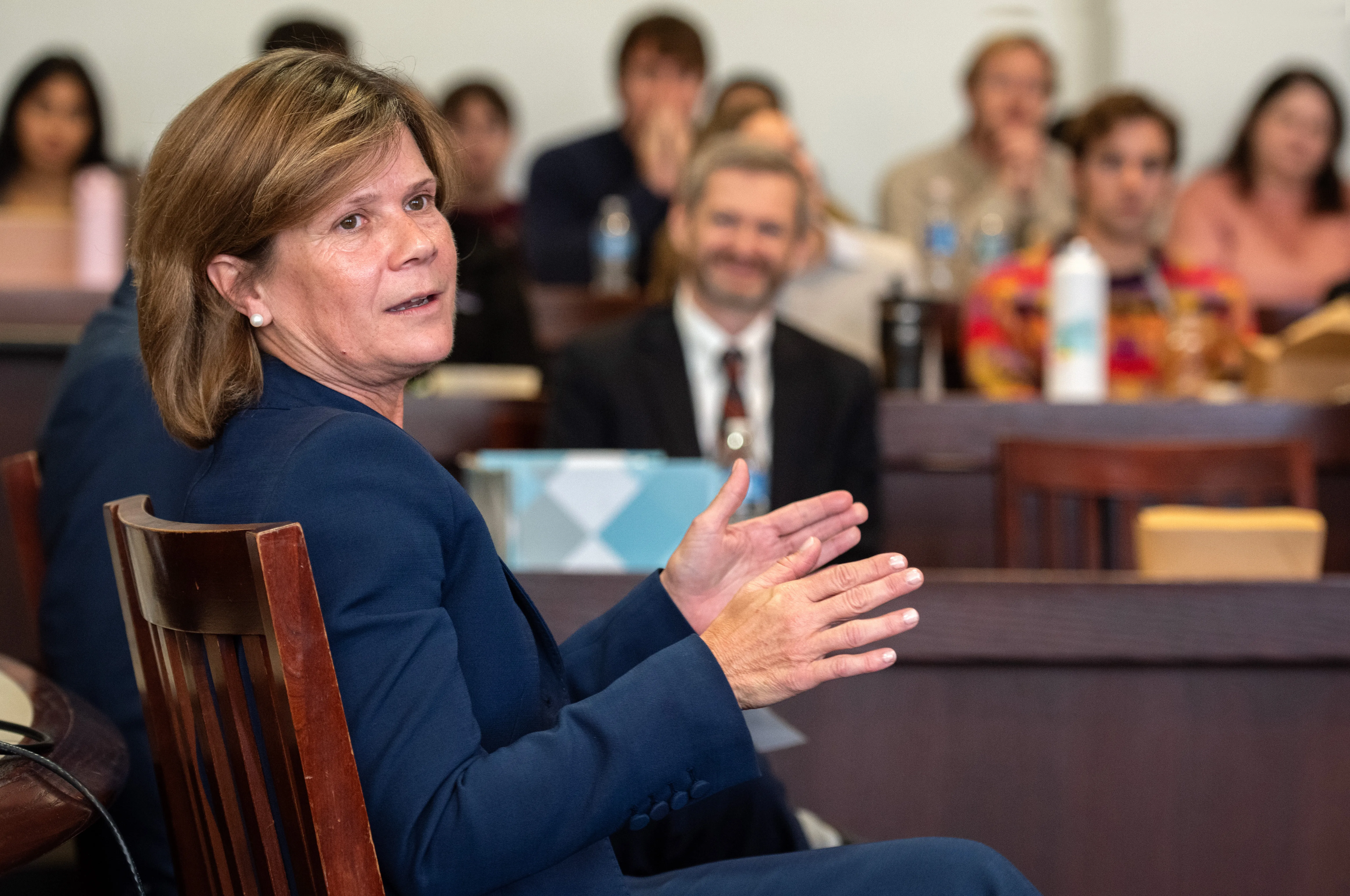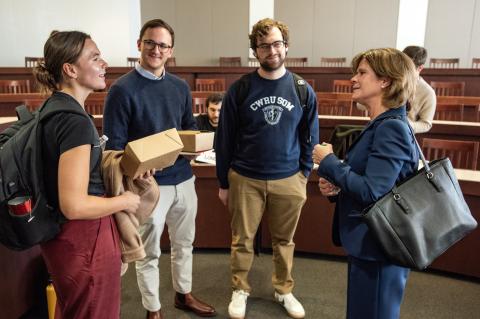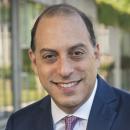Judge Amy St. Eve Recounts Her Path from the District Court to the Court of Appeals

When Judge Amy St. Eve was appointed as a United States District Court Judge for the Northern District of Illinois in 2002, she was one of the youngest federal judges in the country.
“I applied, not thinking I had a chance because I was thirty-five,” she recalled. However, bipartisan support from both Republican Senator Peter Fitzgerald and Democratic Senator Dick Durbin made her an ideal candidate.
“[Senator Fitzgerald] liked that I was young and he liked that I was independent. He liked that I had prosecuted both Republicans and Democrats,” she said. “And so the stars really lined up.”
St. Eve visited the Law School for the first Edward H. Levi Distinguished Visiting Jurist lecture of the academic year on October 16. With Professor Lior Jacob Strahilevitz moderating the conversation, St. Eve, who is one of the most highly cited judges in the country, shared many insights into her extraordinary career. She also shared some interesting moments, such as when she admonished former President Donald Trump and the opposing counsel questioning him during a 2013 trial, only to be nominated by Trump five years later as a United States Circuit Court Judge for the Seventh Circuit.
St. Eve recalled her experience being invited to the White House to interview for that opening on the Seventh Circuit: “I called my husband after the interview and said, ‘That was really interesting. And there's no chance I'm getting this job.’”
Nonetheless, after her nomination, the Senate unanimously confirmed St. Eve’s nomination by a vote of 91 - 0, a significant showing of bipartisan support in 2018.
St. Eve’s district court experience became fundamental in how she approached her role as an appellate judge on the Seventh Circuit.
“I know behind every case, there are people. I’ve seen them in the [district] courtroom,” she said. “At the Court of Appeals, we just get the stack of paper and the record. But I am very, very aware that there are people and we’re impacting people’s lives in what we do. Because of that, I’m sensitive to the cases. I’m sensitive to writing opinions, knowing that somebody’s going to lose, and you want to make them feel at least like they had their day in court.”
“I also know that we’re the last stop for 99% of the cases,” she said. “They can appeal to us as a matter of right, but when they go to the Supreme Court, they have to get certiorari granted. And that happens so rarely. So, I’m very conscious of that for each case.”
St. Eve also shared how often oral argument makes a difference for the outcomes of her cases. “I generally have an idea of where I’m coming out,” she said. “But sometimes I’m on the fence and I think I need to hear the answer to some questions. Or sometimes I might go in and think one thing and either the lawyer or one of my colleagues brings up something that makes me think differently. So oral argument certainly can make a difference, but not necessarily in every case.”
During the Q&A, a student asked St. Eve what she had to sacrifice to become a “crazy successful person,” generating laughter across the room.
“Your question is interesting because I think some of this is generational,” she said. “In the generation ahead of me, judges stayed on courts forever because that was their identity—this is a very generalized statement; there are certainly exceptions. But I think for my generation and the ones behind me, we do identify ourselves a bit differently and don't think of ourselves as judges first.”
St. Eve shared that she is a mother of three children who all played travel soccer, and that she “chaperoned more soccer games and trips than [she] care[s] to admit.” She also shared that she has many hobbies, such as running, cooking, and traveling.
On the other hand, St. Eve’s personal and professional personas are not mutually exclusive. “I don't know exactly how many clerks I’ve had— twenty-two years of clerks. I used to say when I first started, they were like my sisters or brothers. Now they're like my kids,” she laughed. “And I really value those relationships.” It’s one of the things she would miss most if she were to retire, she said—her relationship with her clerks.
“I always tell my clerks, ‘If I don't hear from you, you’ll hear from me,’” she said. “I consistently reach out to them. I try to check in with former clerks at least twice a year just to see how they're doing.”
When asked about law clerk hiring, St. Eve shared her philosophy.
“I care less about ideology. What I care about is that you're intellectually honest,” she said. “I do think it's important to have a diverse group of clerks. And I don't just mean ideology, but perspective, viewpoints, schools—because that makes the end-product better and that pushes all of us to think a little bit more.”
Faith Noh is a member of the Class of 2026 at the Law School. She grew up in Edmonds, Washington and graduated from the University of Washington in 2023. At the Law School, she is a board member of Asian Pacific American Law Students Association and Christian Legal Society.

